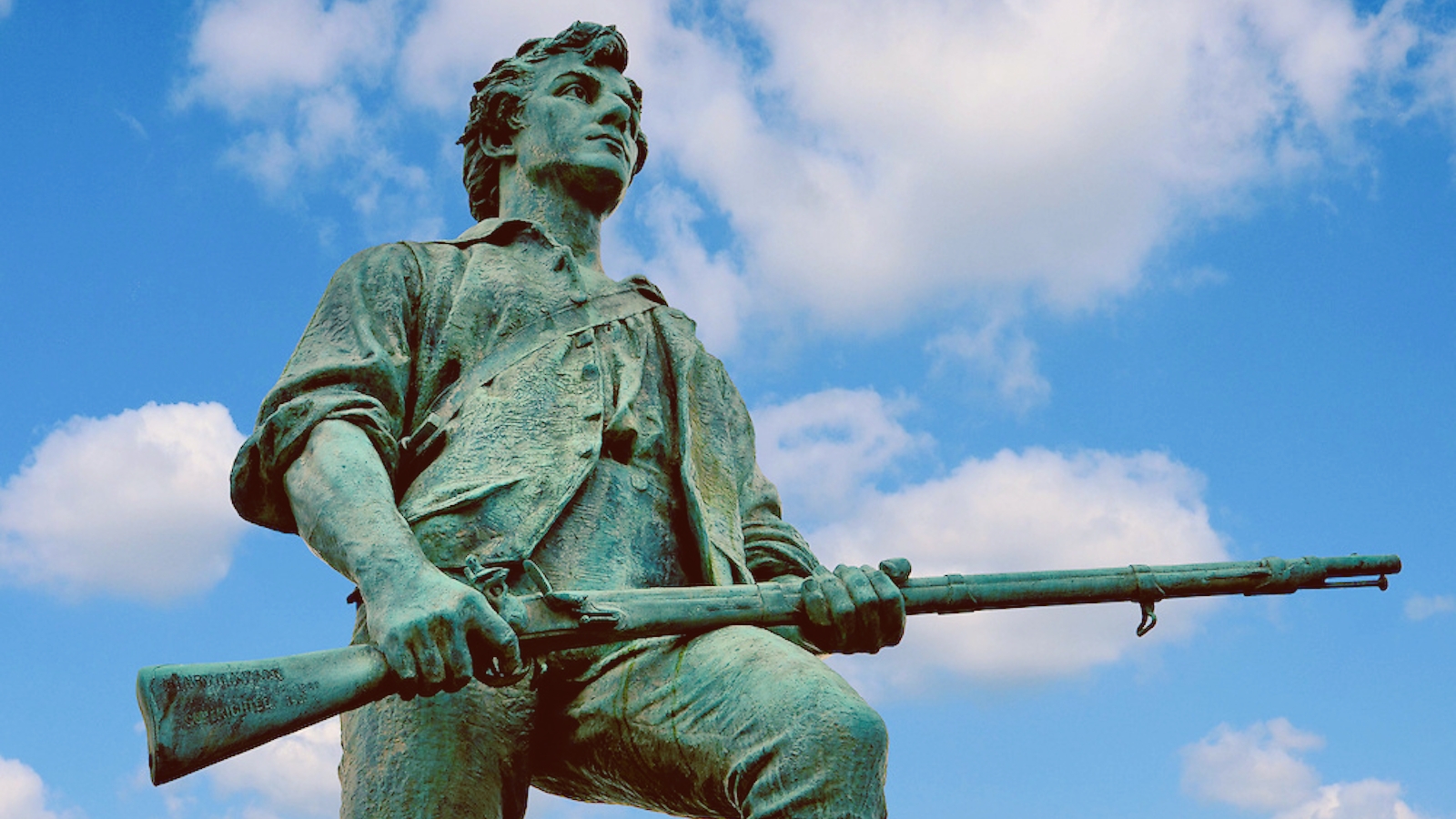
What Has Happened to the Birthplace of American Liberty?
Two hundred and fifty years ago a group of exceptionally brave men stood on a field in the center of a small agricultural hamlet in the eastern part of the Massachusetts Bay Colony. They there gathered, intent on defending their liberties and those of their kin, by confronting a contingent of the largest military of the day—equally intent on subjugating those same liberties.
This type of courage is quite rare these days in an age where so many have proven themselves to be more willing to acquiesce to societal and governmental despotism and tyranny than to stand against it.
Everywhere you look today it seems that the legitimacy of Jefferson’s dour premonition, “The nature of things is for Liberty to yield and government to gain,” teams with the Madisonian adage “I believe there are more instances of the abridgment of the freedom of the people by gradual and silent encroachment of those in power than by violent and sudden usurpations,” to effectuate an abandonment of the principles of liberty—the very principles in which this nation was conceived. The township which touts itself as “The Birthplace of American Liberty,” is anything but an exception to this despotic digression.
When the citizens (then, technically, “subjects”) of this tiny community decided to rename it “Lexington” from the previous name, “Cambridge Farms,” the year was 1713. The community was just what the previous name had inferred: a farming community content to be rural, independent, and rugged. This status went largely unchanged with slow growth through the end of the 19th century. It was then that a “Progressive” (odd as is that tyranny could ever be interpreted as “Progressive”) migration from the communities just to the east began to infiltrate the town.
The rural independent nature of the populace and the agricultural base began to erode, and the character was slowly subsumed by a growing number of socialist minded individuals who favored forced-collectivism to allowed-individualism. The tide has not since shifted—on the contrary. To those of us who prefer not to be slaves to society or society’s governments, it only appears to be getting worse.
Now this latest plague that has infested the overeducated statist class, “wokeism”, has been brought to bear on this town, with a full abandonment of an essential element of justice in any jurisdiction: egalitarianism—equal justice under the law. This duplicity is now on full display—right in the center of the town.
Up until about twenty years ago, and for over a hundred straight years prior, a creshe (the Christian manger scene) was displayed on the village green. A town bylaw outlawing such religious displays on government land was passed and creshes can now only be seen on private property in the community. This ordinance itself is, admittedly, in keeping with one of the sound principles of a society dedicated to the standards of Liberty: the separation of Church and State. This principle helps ensure that neither of these enterprises is contaminated by the other. It is a healthy and necessary separation and has, at its heart, the acknowledgment that one of these enterprises relies on faith (which itself requires the abandonment of reason) for its operation and must be allowed as wide a berth as it wishes in civil society as long as no body or property rights are violated in the process, and the other cannot be allowed to indulge in such an abandonment, but must be restricted to the use of reason in every application of its authority—and that authority and scope must, itself, be strictly limited to a minimalist standard.
As such this bylaw, if applied in an egalitarian fashion, is consistent with one of the core principles of Liberty by providing this essential separation, and must therefore be viewed as appropriate.
However, the fly in this particular ointment is not the law itself, but how it is applied. For in this application, comes an unacceptable compromise—the compromising of egalitarianism. It appears that this bylaw only applies to the Christian faith as, on government land, not five hundred feet from the statue of Captain John Parker, the head of the Lexington Militia at the legendary battle on the Green where the monument is situated, stands this:

Now, while it may well be possible to successfully argue that the Muslim faith is not a religion (a nondestructive faith-based organization), but rather a cult (a destructive faith-based organization) due to its dedication to the elimination of all those who do not accept its tenets through the violent application of the Sword Verses Jihad, it cannot be successfully argued that it isn’t a faith-based organization. As a faith-based organization, it must be subject to the same restrictions that any other faith-based organization is subjected to, lest the essential standard of egalitarianism be abandoned and all that is remotely just, be abandoned right along with it.
In considering the obvious abandonment of this essential element of justice as defined by the tenets of Liberty in this instance, one must ask, how the construction of such an edifice could ever be permitted or tolerated in any community in our nation in the face of laws which prohibit it, let alone in the town that claims itself to be “The Birthplace of American Liberty”?
Harkening back to that Madisonian adage, exactly who is in power and abridging the freedoms of the People? The putridity of this hypocrisy can only be interpreted as a further regression of this community from the lofty heights of Liberty it personified in the late 18th Century to the lowly depths of woke despotism making its presence obvious now in the early 21st Century.
Thus, the town has now positioned itself to be no longer worthy not of the title, “The Birthplace of American Liberty,” but rather the more fitting, “The Birthplace of the Death Knell of American Liberty.”
Free the People publishes opinion-based articles from contributing writers. The opinions and ideas expressed do not always reflect the opinions and ideas that Free the People endorses. We believe in free speech, and in providing a platform for open dialogue. Feel free to leave a comment.



